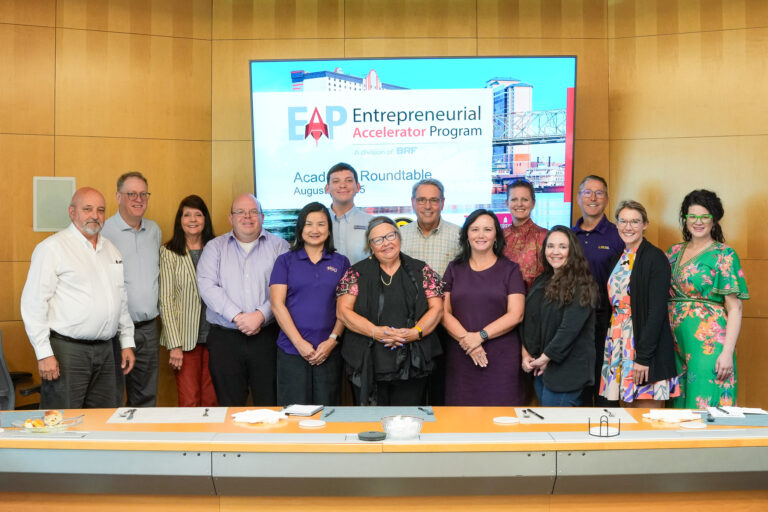University + Entrepreneurship = Startup Success
As students across North Louisiana return to campus this fall, their focus will naturally turn to the usual mix of math, science, and history. But alongside those traditional subjects, a growing number of students are engaging in something less obvious but increasingly vital: entrepreneurship. While a college degree is not required to launch a business, universities remain one of the most fertile environments for entrepreneurial thinking to take root. They offer an unmatched combination of mentorship, resources, and networks that help young people spot opportunities, test ideas, and develop the leadership skills needed to run a company or step directly into important roles at companies.
On August 1st, BRF’s Entrepreneurial Accelerator Program (EAP) brought together leaders from six universities—Northwestern State, Grambling State, Louisiana Tech, LSU Shreveport, Centenary College, and the University of Louisiana Monroe (ULM)—for an Academic Entrepreneurship Roundtable. The gathering served as a space to exchange ideas on how to better prepare students for the realities of building and leading businesses, as well as how to keep that talent in Louisiana after graduation. The conversation revolved around the need to connect students more directly with the state’s growing startup ecosystem, integrate them into private markets, and expose them to real-world innovation at an earlier stage in their college careers.
Many universities are already weaving entrepreneurship into their DNA. Some are embedding it into coursework across disciplines, while others are launching dedicated programs, incubators, and mentorship networks. On campuses across the region, students are finding more opportunities to bring their ideas to life. Science majors are collaborating with business students to turn concepts into prototypes and business plans. Entrepreneurship centers and innovation programs are encouraging students of all backgrounds to explore marketable ideas, and others provide mentorship initiatives that help them connect directly with business leaders in the community. These efforts create experiences for problem-solving and resilience that successful founders need.
EAP’s University Pitch Competition has become a cornerstone of this work in North Louisiana. It gives students the chance to step into the shoes of a founder by pitching to real investors, fielding hard questions, and refining their concepts under pressure. For some, the experience is a confidence boost; for others, it’s the launchpad for a viable business. On top of the skill building, this is a place for energized students to collaborate and contribute to a meaningful project while learning about how private businesses are started, funded, and scaled.
At the state level, ULM’s Pelican Cup raises the stakes even higher. As one of the largest collegiate business plan competitions in the South, it offers over $100,000 in prizes and attracts teams from across Louisiana. For students, it’s an opportunity to test themselves against top talent from other regions, gain exposure to seasoned entrepreneurs and investors, and, in some cases, walk away with the funding and connections to turn their ideas into thriving ventures.
The economic argument for this kind of university engagement is strong. Studies by the Association of Public and Land-grant Universities show that universities generate billions in regional economic impact annually, not only through direct spending but through research commercialization, workforce development, and startup creation. Louisiana’s institutions are already producing graduates in high-demand sectors such as healthcare, manufacturing, and technology. By layering entrepreneurial skills on top of those technical foundations, the state is developing a workforce that doesn’t just fill jobs but creates them.
Retention of these students in the state after graduation remains one of the biggest challenges. Too often, Louisiana’s most promising graduates leave for larger markets with more visible startup activity. The more opportunities students have to connect locally, either through competitions, internships, or industry partnerships, the more likely they are to see North Louisiana as a place where they can launch and scale their careers. Programs like EAP’s University Pitch Competition and ULM’s Pelican Cup, combined with the education and support from local universities, are not only developing skills but also creating the local ties that help keep talent rooted here.
The August roundtable made one thing clear: universities in North Louisiana are more than academic institutions. They are incubators of innovation, critical connectors between young talent and private industry, and accelerators of regional growth. By continuing to align academic programs with real-world entrepreneurial opportunities, the region can ensure that its next generation of leaders is ready not just to succeed in business but to build the companies that will define Louisiana’s future economy.

